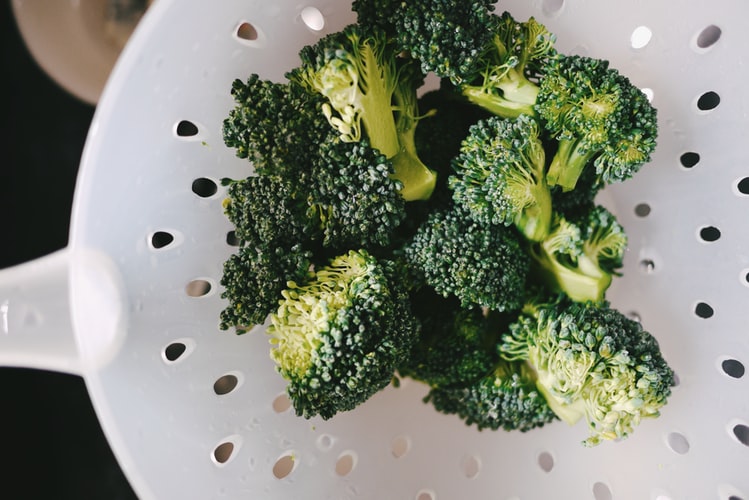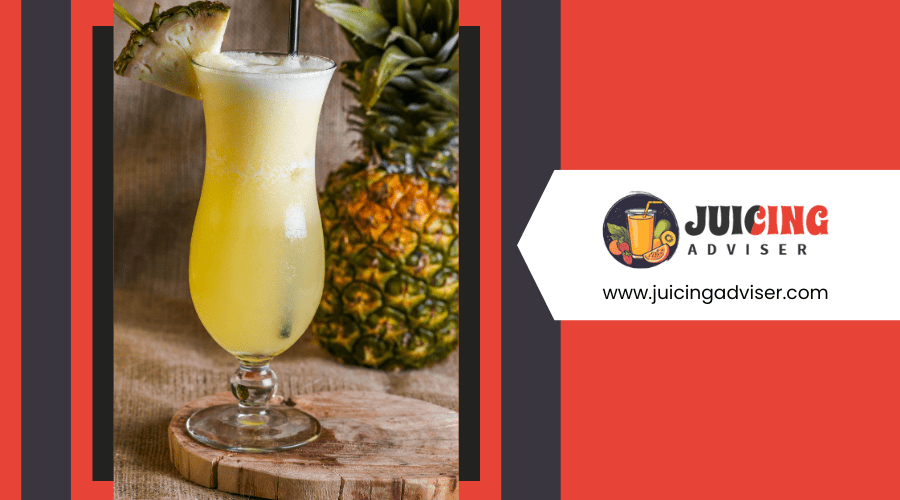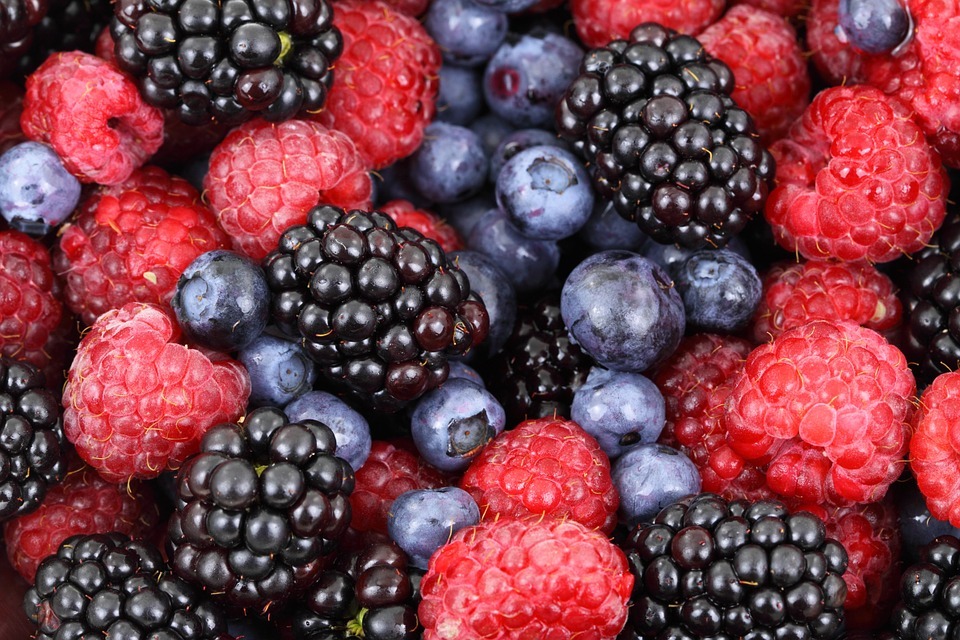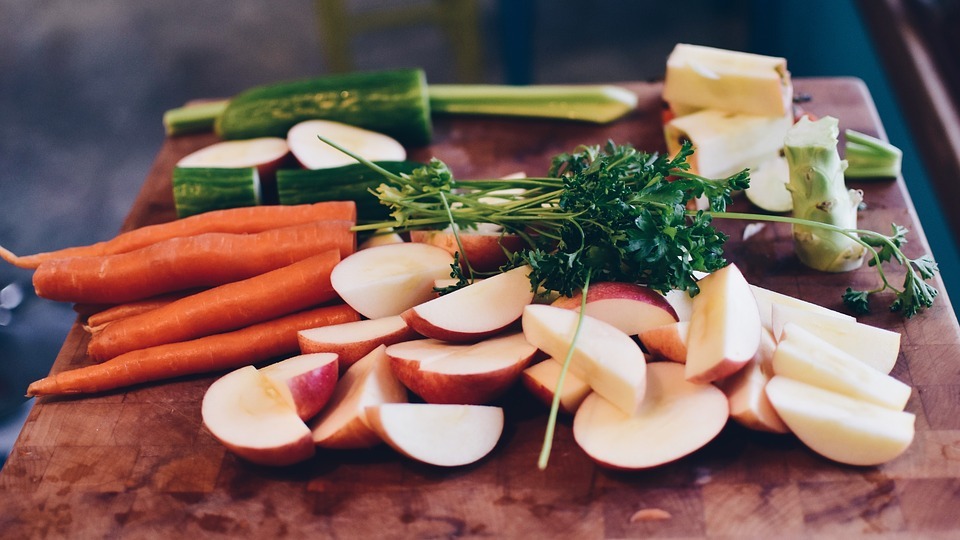Is Fruit Juice Always Vegan?
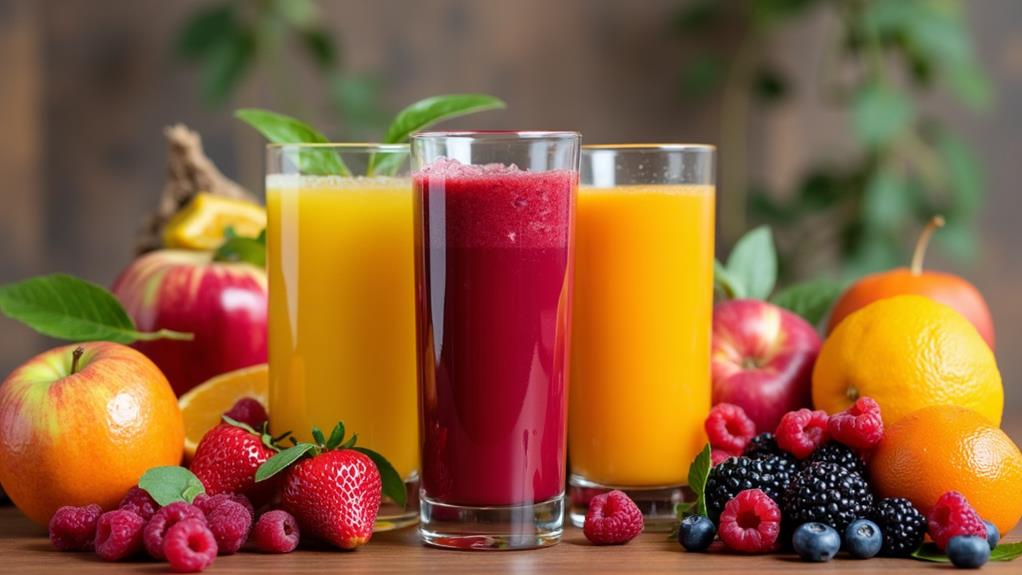
When you pick up a bottle of fruit juice, you might assume it's vegan, but that's not always the case. Many juices contain hidden non-vegan ingredients like vitamin D3 derived from lanolin or gelatin used in the clarification process. Even the sugar in some juices might be processed with bone char. How can you be sure your juice aligns with your vegan values? Look for specific labels and certifications that indicate the product is vegan. It's essential to read ingredient lists and understand the manufacturing processes to make an informed choice.
Non-Vegan Juice Ingredients
When choosing fruit juice, it's important to note that not all options are vegan-friendly. Many juices contain non-vegan ingredients. For example, vitamin D3, often added for nutritional value, is frequently derived from lanolin, a substance sourced from sheep's wool. This means that juice can contain animal products.
Additionally, some juices are fortified with omega-3 fatty acids, which are beneficial for health but can come from fish oil, making them unsuitable for a vegan diet. Certain colorings and flavor enhancers derived from animal products can further complicate the vegan status of these beverages.
Another concern is the sugar used in juice production. In non-organic varieties, sugar can be refined using bone char, which is made from animal bones. This process renders even simple orange juice non-vegan for those strictly avoiding animal products.
Gelatine in Juice Production
Gelatine, derived from animal collagen, is commonly used to clarify cloudy juices in the production process. This can leave residual gelatine, making the juice unsuitable for vegans. To avoid this, opt for juices labeled as "naturally cloudy," which typically do not use gelatine.
Gelatine's Clarification Role
Gelatine's use in juice production often surprises those who assume all juices are inherently vegan. Gelatine is a common clarifying agent used to remove cloudiness and improve the clarity of many juices. While this process makes the juice more visually appealing, it introduces non-vegan ingredients. Gelatine is derived from animal collagen, primarily sourced from bones, posing a problem for vegans who avoid animal products.
During juice production, gelatine binds with cloudy substances, helping to clarify the liquid. However, residues of gelatine may remain, potentially leaving traces in the final product. Even if the juice looks crystal clear, it might still contain remnants of gelatine, making it unsuitable for vegans.
To avoid this, look for juices labeled as "naturally cloudy," as they typically do not undergo this clarification process. By choosing these options, you can more confidently avoid consuming products that contain gelatine and other non-vegan ingredients. Always check labels carefully to ensure they align with your dietary preferences.
Animal Collagen Source
Ever wondered where the gelatine used in juice production comes from? It's derived from animal collagen, primarily sourced from bones. This may come as a surprise, but gelatine is crucial for making your juice look clear and appealing. During production, gelatine binds with cloudy particles in the juice, effectively removing them and resulting in a clearer final product.
However, the use of gelatine raises concerns for those following a vegan lifestyle. Since gelatine is an animal product, its presence in juice makes it non-vegan. Even though the clarification process aims to remove gelatine residues, not all producers can guarantee complete elimination. This uncertainty means some juices may still contain residual animal products, which is problematic for those strictly avoiding animal-derived ingredients.
To ensure you're consuming vegan-friendly juice, look for options labeled as "naturally cloudy." These typically don't undergo the same clarification processes involving gelatine. By choosing these options, you can enjoy your juice without worrying about inadvertently consuming animal products.
Residue and Veganism
In juice production, the presence of gelatin residue raises significant concerns for vegans. Gelatin, derived from animal collagen found in bones, is commonly used to clarify juices, making them non-vegan. During the clarification process, gelatin binds to cloudy substances, but it's not guaranteed that all residue is removed. This means traces could linger in your juice, compromising its vegan status.
Many clear juices utilize gelatin for this purpose. If you're committed to a vegan lifestyle, it's safer to opt for naturally cloudy juices, which typically don't undergo the same clarification process, thus reducing the risk of gelatin contamination. Always check the labels for "naturally cloudy" indicators or scrutinize the ingredient list to verify there's no mention of gelatin or other animal-derived ingredients.
Awareness is key. Some brands might not explicitly state their use of gelatin, making it crucial to do a bit of research or contact the manufacturer if you're unsure. By being vigilant and informed, you can avoid hidden animal-derived ingredients and make choices that align with your vegan principles, ensuring your juice is truly vegan-friendly.
Naturally Cloudy Juices
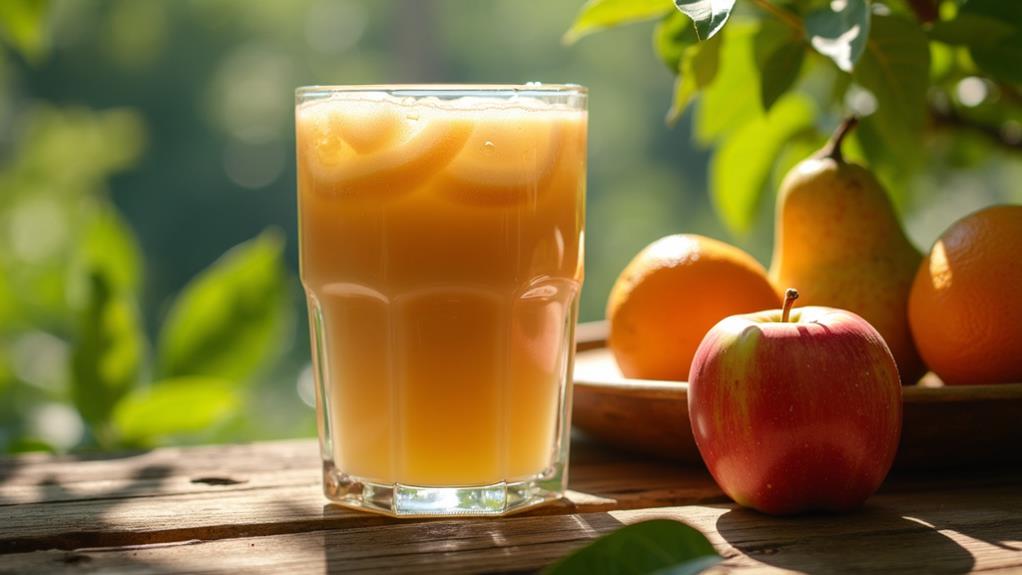
Choosing naturally cloudy juices ensures you're selecting a product free from animal-derived ingredients like gelatin. These juices offer a thicker texture and more nutrients, and they clearly indicate on their labels that no such additives are used. Always check for "naturally cloudy" labels to confirm you're choosing a truly vegan option.
Gelatine-Free Production Methods
Naturally cloudy juices are an excellent choice for those pursuing a vegan lifestyle. These juices are produced using gelatine-free methods, meaning no animal-derived products are involved. Gelatine is commonly used in clear juices for clarification, rendering many non-vegan. By opting for naturally cloudy juices, you can be assured of consuming a truly vegan beverage.
Labels indicating "naturally cloudy" or "no gelatine" make it easier to identify vegan-friendly options. Brands like Rabenhorst are dedicated to producing gelatine-free juices, ensuring their products are suitable for vegans.
When shopping for juice, look for labels that state "naturally cloudy" or "no gelatine." These indicators help you make informed choices and avoid any potential animal-derived ingredients. By choosing naturally cloudy juices, you're not only enjoying a refreshing drink but also supporting ethical and vegan production practices. So, next time you're in the juice aisle, select naturally cloudy options for an authentic vegan experience.
Benefits of Cloudy Juices
Naturally cloudy juices offer a variety of benefits, making them an excellent choice for those adhering to a vegan diet. These juices skip the clarification processes that often use animal-derived gelatin, ensuring they are free of non-vegan ingredients.
By retaining more of the fruit's natural pulp and fiber, naturally cloudy juices provide extra nutritional benefits. Fiber is crucial for a healthy digestive system and is often lost in clear juices. Labels indicating "naturally cloudy" assure you that no animal products were used, aligning your choice with vegan principles.
Opting for naturally cloudy juices helps you avoid hidden non-vegan additives. Some clear juices use fining agents to achieve clarity, which can be non-vegan. Brands like Rabenhorst produce naturally cloudy juices, ensuring a vegan-friendly product.
Here's a quick comparison to highlight these benefits:
| Juice Type | Clarity Process Involved | Vegan-Friendly |
|---|---|---|
| Naturally Cloudy Juice | No | Yes |
| Clear Juice | Yes (potentially gelatin) | No |
| Pulp-Retained Juice | No | Yes |
| Filtered Juice | Yes | Sometimes |
Choosing naturally cloudy juices is a smart, vegan-friendly option.
Identifying Vegan Labels
To ensure your juice is truly vegan, look for labels indicating "naturally cloudy." These juices typically avoid animal products like gelatin for clarification, making them a safer choice for vegans. When you see "naturally cloudy" on the label, you can be more confident that the juice hasn't been processed with non-vegan clarifying agents.
Clear juices often use gelatin to achieve their transparency. To maintain a vegan-friendly diet, it's wise to avoid these and opt for cloudy varieties. Reading labels thoroughly helps you spot juices free from animal-derived additives, ensuring they align with your vegan principles.
Brands that label their juices as "naturally cloudy" often prioritize vegan practices and consciously avoid hidden animal substances in their processing methods. By choosing these brands, you support companies committed to vegan-friendly production. So next time you're shopping, remember: naturally cloudy juices are a dependable choice for maintaining a vegan diet. Always check the labels!
Vegan Juice Brands
When searching for vegan juice brands, a few stand out for their commitment to offering 100% fruit juices without non-vegan additives. Brands like Cawston Press, Juice Burst, Tropicana, and Innocent are popular choices that guarantee their products are free from animal-derived ingredients. For instance, these brands ensure that their orange juice is vegan, using pure fruit without hidden animal products.
Rabenhorst is another excellent option, providing a range of juices clearly labeled as vegan. They go the extra mile to ensure their juices are free from gelatine and other animal derivatives. When shopping for juice, always look for explicit vegan labeling to avoid any surprise non-vegan additives.
Many of these brands focus on high-quality fruit, avoiding preservatives and artificial flavor enhancers. This makes them suitable for vegans and guarantees a healthier choice in general. Additionally, consider supporting local producers. Often, you'll find fresh, vegan-friendly juice options from local sources that are made without any additives.
Packaging Considerations
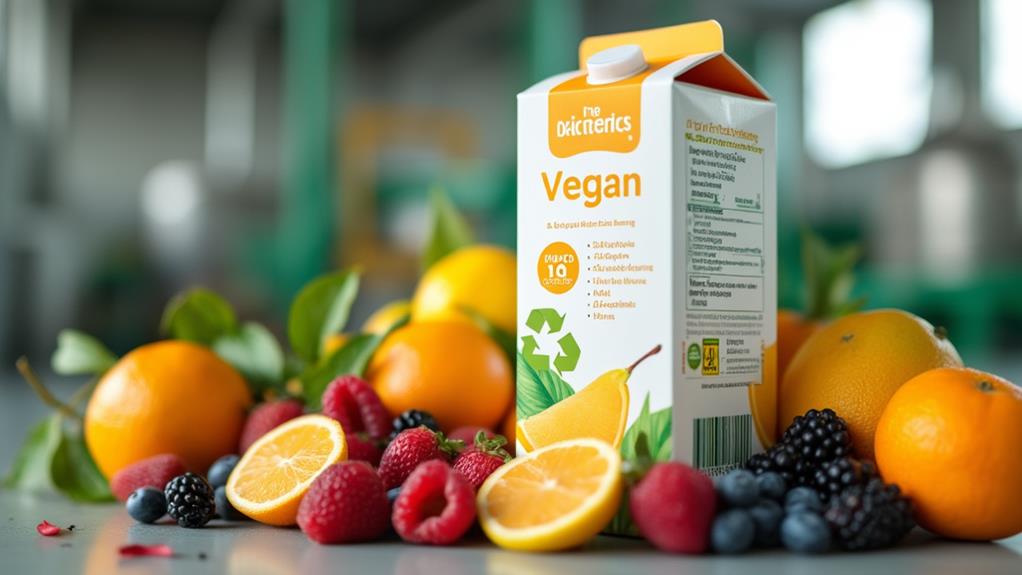
When choosing vegan juice brands, it's crucial to consider the packaging as well. Packaging is significant because some adhesives, like casein glue derived from milk, are not vegan-friendly. Even if the juice itself is vegan, the packaging could contain non-vegan components. Check for vegan-specific labels on the bottles to ensure your purchase aligns with your ethical consumption practices.
For example, the juice brand Rabenhorst guarantees that all its labels use vegan adhesives, promoting transparency in their packaging practices. This commitment allows you to make informed choices and support brands that align with your vegan principles. It's not just about the juice; the entire product needs to meet vegan standards to be considered truly vegan-friendly.
Consumers often overlook packaging, but it can be a concern for strict vegans. While packaging materials are frequently not animal-derived, the adhesives used can be. By supporting brands that explicitly state their commitment to vegan packaging, you contribute to a more ethical and transparent market. Always scrutinize labels carefully to confirm that both the juice and its packaging meet your vegan criteria.
Nutritional Benefits
Fruit juices provide numerous nutritional benefits, making them a valuable part of a balanced diet. They are rich in essential nutrients that can significantly enhance overall health. For instance, citrus juices like orange juice are particularly abundant in vitamin C, which is crucial for immune function and skin health. Additionally, many fruit juices are good sources of potassium, which helps regulate blood pressure and supports cardiovascular health.
Key nutritional benefits include:
| Nutrient | Benefit |
|---|---|
| Vitamin C | Boosts immune function and enhances skin health |
| Potassium | Regulates blood pressure and supports heart health |
| Antioxidants | Reduce inflammation and lower chronic disease risk |
| Flavonoids | Support cognitive function |
| Hydration | Contribute to daily fluid intake |
Many fruit juices are also rich in antioxidants, which help reduce inflammation and lower the risk of chronic diseases. Juices made from berries are high in flavonoids, which support cognitive function. Furthermore, fruit juices can help you meet your daily fruit intake recommendations, providing essential nutrients and hydration. However, be cautious of added ingredients that might diminish their nutritional value. For optimal health benefits, choose fruit juices with minimal added ingredients.
Additives in Orange Juice
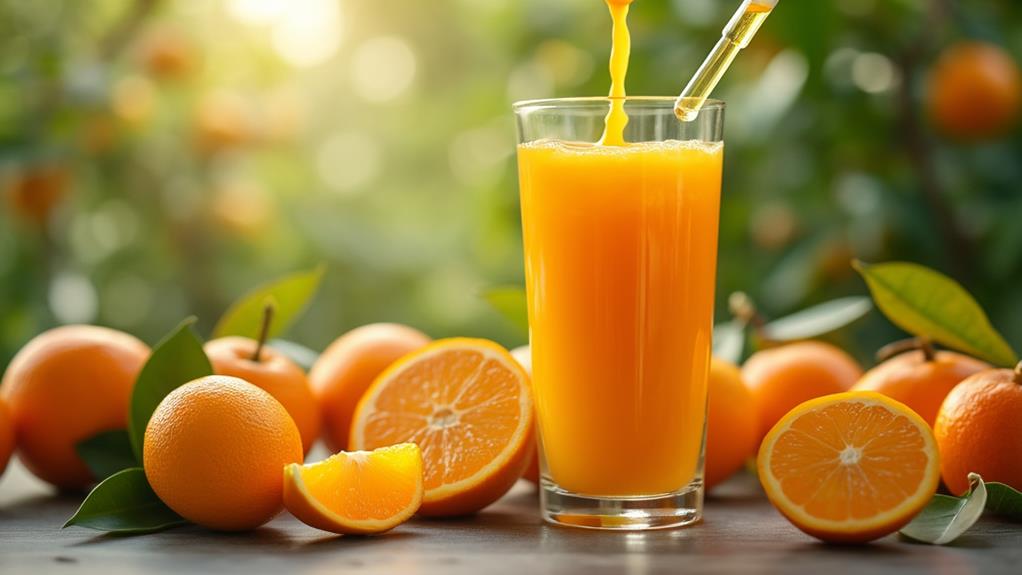
When choosing orange juice, be aware of potential non-vegan additives such as vitamin D3 derived from sheep's wool or omega-3s sourced from fish oil. Additionally, some added sugars may be processed using bone char. To ensure your juice is vegan, always verify the origin of every ingredient by checking the labels.
Common Non-Vegan Additives
Navigating the world of orange juice can be challenging for those committed to a vegan lifestyle. While it may seem like a simple product, added ingredients can make a significant difference. Common non-vegan ingredients in orange juice include Vitamin D3, often derived from lanolin found in sheep's wool, making some fortified juices unsuitable for vegans.
Omega-3 fatty acids can also pose a problem, as they are typically sourced from fish oil, which is not vegan-friendly. Even artificial flavorings, which might be presumed to be plant-based, can sometimes be derived from animal sources, adding complexity to your choices.
Color additives are another concern. Some of these are derived from animal products, compromising the vegan integrity of your juice. Additionally, the sugar used in orange juice, though plant-based, can be processed with bone char, an animal-derived product, rendering the juice non-vegan despite its seemingly innocent appearance.
Being aware of these common non-vegan additives can help you make informed choices, ensuring you stay true to your vegan lifestyle while enjoying your orange juice.
Hidden Animal Ingredients
Navigating the ingredient list of orange juice can reveal a surprising number of hidden animal-derived additives that may catch even the most diligent vegans off guard. Some ingredients may seem harmless at first glance, but a closer look often reveals they are not vegan-friendly.
For instance, many orange juices include vitamin D3, which is often derived from lanolin, a substance sourced from sheep's wool. Additionally, omega-3 fatty acids, sometimes added for their health benefits, can be sourced from fish oil, making the juice non-vegan. Even the sugar used in some orange juices can be refined with bone char, an animal by-product.
Here are three hidden animal-derived additives to watch out for:
- Vitamin D3 - Often derived from lanolin, making it unsuitable for vegans.
- Omega-3 fatty acids - Commonly sourced from fish oil, raising vegan concerns.
- Refined sugar - Sometimes processed using bone char, which is not vegan-friendly.
To maintain your vegan lifestyle, always scrutinize the ingredients label beyond the front packaging. Hidden animal-derived additives can turn your seemingly innocent glass of orange juice into a non-vegan product.
Ensuring Vegan Compliance
Ensuring your orange juice is genuinely vegan can be challenging due to hidden animal-derived additives. Many commercial orange juices may contain ingredients like Vitamin D3, often sourced from lanolin in sheep's wool, and Omega-3 fatty acids derived from fish oil.
Added sugar is another concern, as it may be processed using bone char, an animal by-product. Additionally, artificial flavors and colorings may originate from animal sources, necessitating careful scrutiny of ingredient labels.
To ensure your orange juice is vegan, choose products labeled as 100% pure orange juice with no added ingredients beyond oranges. These labels generally indicate the absence of non-vegan fortifications or sweeteners. Always exercise caution and conduct thorough research, as even seemingly simple products can contain hidden animal-derived additives. By staying vigilant and informed, you can enjoy your orange juice without compromising your vegan principles.
Identifying Vegan Juice
Identifying vegan juice can seem tricky at first, but it's all about paying attention to the details on the label. Key ingredients to look out for include vitamin D3, often derived from lanolin (sheep's wool), and omega-3 fatty acids, which can come from fish oil, making them non-vegan.
Here are three tips to help you find vegan juice:
- Read the Ingredients: Look for additives like vitamin D3 or omega-3. Labels that specify "100% pure juice" or "freshly squeezed" are less likely to contain non-vegan ingredients.
- Avoid Added Flavors and Preservatives: These can sometimes be derived from animal sources. Opt for juices with minimal ingredients.
- Research Brands: Some brands specialize in vegan products and clearly indicate the vegan status on their packaging.
Making Your Own Juice
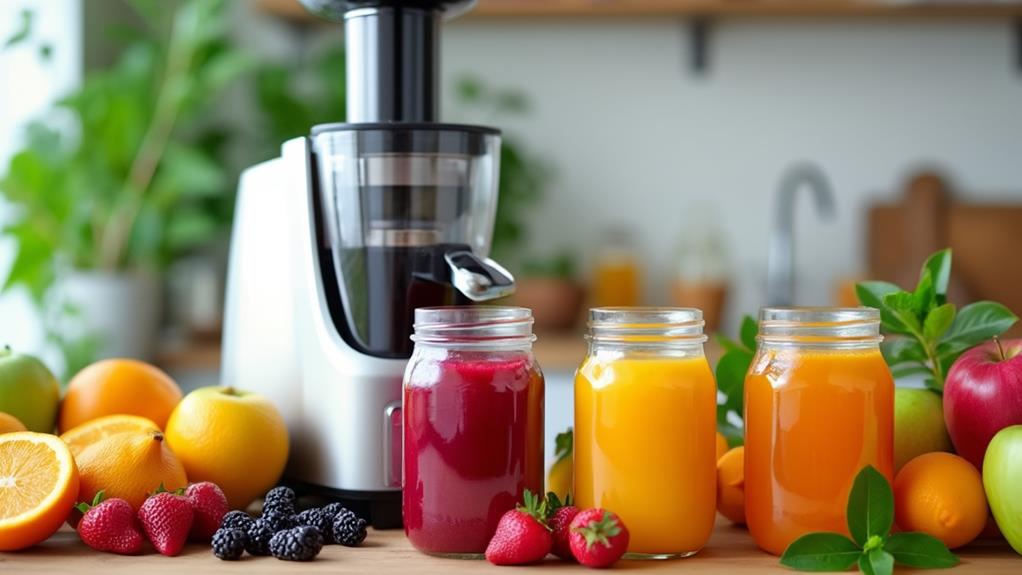
Making your own juice is a fantastic way to ensure your beverage is entirely vegan and free from unwanted additives. When you juice at home, you control what goes into your drink, ensuring it's just pure fruit without any added ingredients that might compromise its vegan status. Plus, you can blend different fruits or add natural sweeteners to create a beverage that perfectly suits your taste.
Using a juicer simplifies the process, making it quick and easy to enjoy fresh juice. A typical cup of freshly squeezed juice requires about 4 to 6 oranges. This might seem like a lot, but the taste and freshness are worth it.
| Fruit | Quantity Needed (for 1 cup) |
|---|---|
| Oranges | 4-6 |
| Apples | 3-4 |
| Carrots | 5-6 |
| Beets | 2-3 |
Making your own juice means you don't have to worry about hidden non-vegan ingredients often found in store-bought options, such as added vitamins or preservatives. By doing this, you ensure every glass you drink is fresh, flavorful, and entirely vegan. So, grab your favorite fruits and start juicing!
Recommendations for Vegans
Navigating the world of fruit juice as a vegan can be challenging, but with a few key tips, you can enjoy your beverages worry-free. Firstly, always check the ingredient label to ensure there are no hidden non-vegan additives. Some juices might contain vitamin D3 derived from lanolin or omega-3 from fish oil, so vigilance is essential.
Here are three important tips to keep in mind:
- Choose "100% Pure" or "Freshly Squeezed": These labels indicate that the juice contains only fruit, without any animal-based processing agents.
- Look for Vegan Labels: Brands like Cawston Press or Innocent specifically label their products as vegan, which ensures they meet vegan standards.
- Avoid Clear Juices: Clear juices may have been clarified using gelatine. Opt for naturally cloudy juices to avoid this issue.
Additionally, verify the source of added sugar in imported juices, as some sugars are processed with bone char. By following these recommendations, you can enjoy your fruit juice without compromising your vegan principles.

